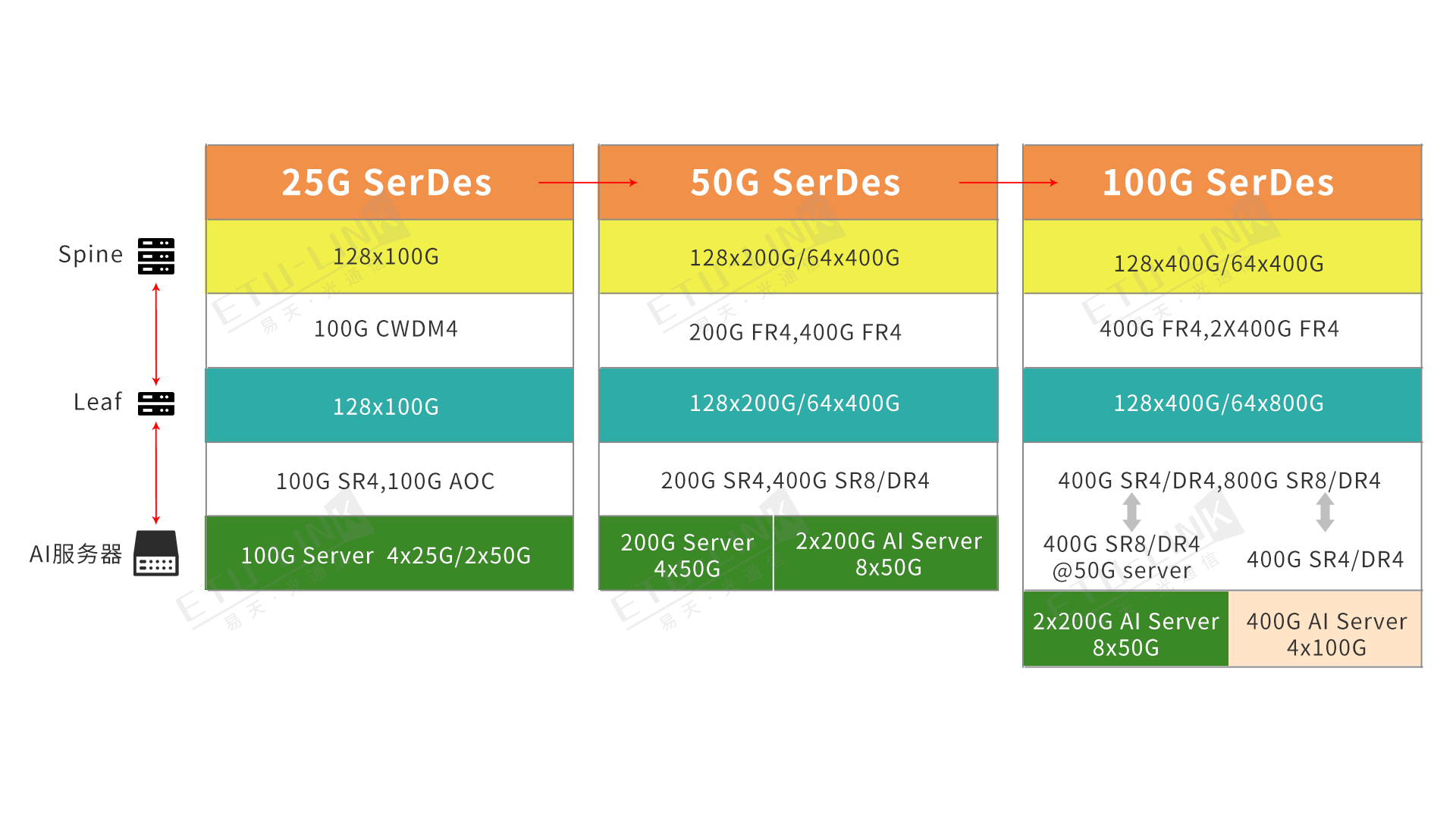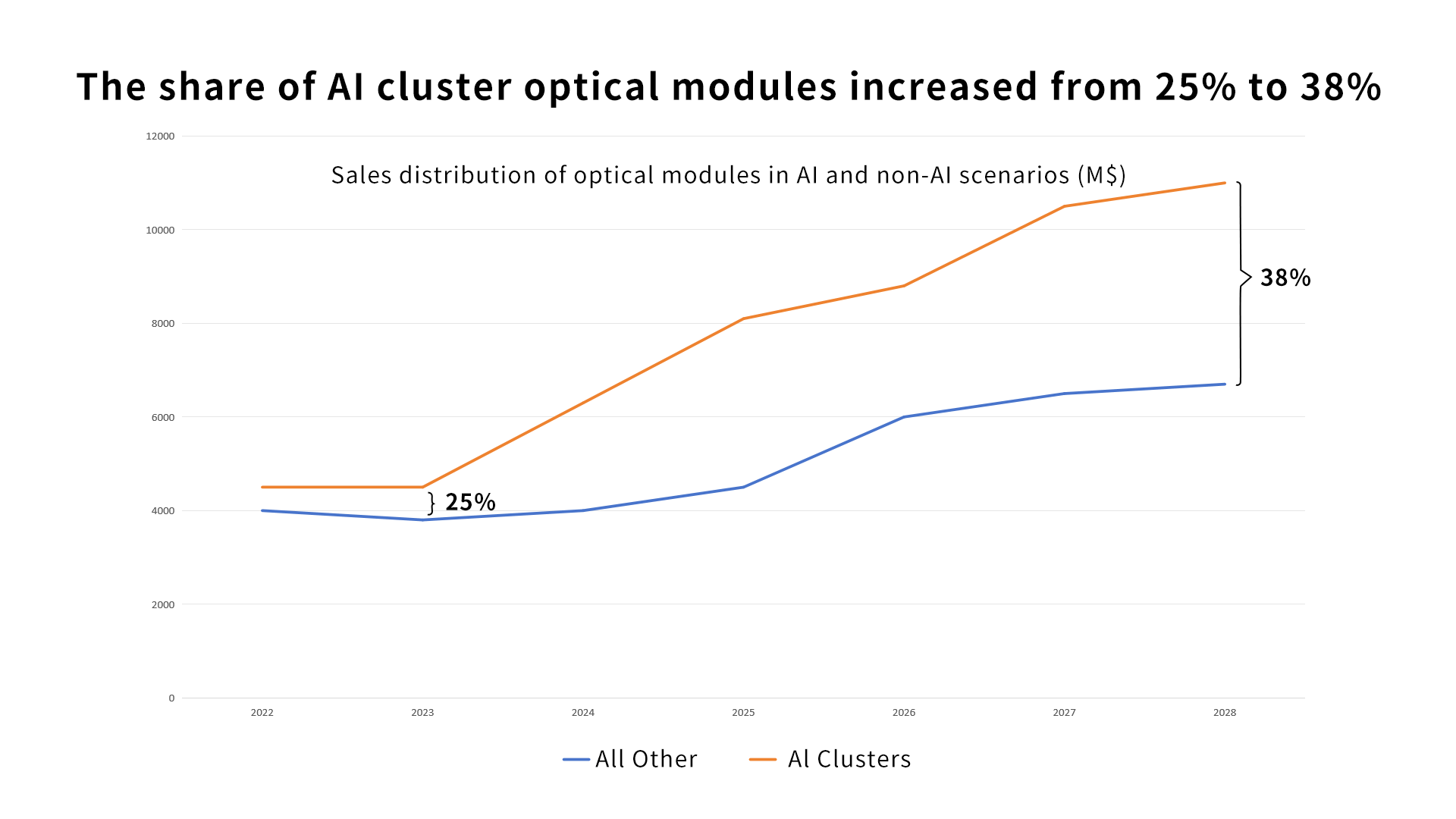400G SR4 and 800G SR8 Optical Modules in AI Clusters
With the rapid development of Artificial Intelligence (AI) technology, the computing power and data transmission needs of AI clusters are increasing. To meet this demand, optical module technology is also advancing. High-rate optical modules, as a new generation of high-speed optical communication solutions, are being gradually applied to AI clusters to provide them with more efficient and stable data transmission capabilities. The port rate of optical modules interconnected in the computer room of the Smart Computing Center has reached 800G, and continues to evolve to high speed (1.6T/3.2T).

I.The next five years in the AI cluster Ethernet optical module demand forecasts
As early as July 23, LightCounting (hereinafter referred to as LC), a research institute within the optical communications industry, released the "Super Data Center Optics Report", which indicated that the total sales of Ethernet optical modules for AI clusters in the next five years will reach $17.6 billion, accounting for 38% of all Ethernet optical modules market. The report forecasts the global Ethernet optical module market size to be around $5.2 billion, $6.5 billion, and $8.3 billion in 2023, 2024, and 2025, respectively, upwardly revised by around 8%, 25%, and 43% from last year's Q1 report, respectively, and it can be seen that the vast majority of incremental growth is coming from the demand for AI clusters, and the organization believes that the application of AI clusters will set off a whole new wave of demand for optical products.
At the same time, LC also said that the new design of large enterprise AI systems will require more optics, and the deployment of head enterprise networks in the next two years may require 2 million 400G SR4 optical modules and 6 million 800G SR8 optical modules. In response, LC significantly raised its 2024 & 2025 Ethernet optical module market forecast, and if combined with the new demand from head enterprises, the digital pass optical module market is highly resilient. Super Ethernet Alliance was established to target high-performance AI cluster networks, Ethernet AI optical modules and application front-end network upgrades will constitute a market driver beyond the head enterprises in the optical communications industry.

II.Development and Application of High-Speed Optical Module in AI Cluster
In AI applications, the surge in data volume puts higher requirements on the bandwidth of optical interconnection technology. Currently, many short-distance links constructed with 400G SR4 and 800G SR8 optical modules use VCSEL lasers with an operating rate of 106Gb/s. The next step in the evolution of the technology is to increase the single-lane rate of the optical channel to 200G/lane, in conjunction with the number of 4-channel optical channels, to further reduce the cost and power consumption of the 800G module; and to synchronously evolve to a single-module bandwidth to 1.6T (8-channel optical path).
In AI clusters, 400G SR4 optical modules are commonly used for the connection between servers and switches. Since AI training and inference processes require large amounts of data transmission, high-speed and stable network connectivity is critical. 400G SR4 optical modules can provide sufficient bandwidth and low-latency transmission environments to ensure that AI model training and data processing are carried out efficiently. 800G SR8 optical modules are mainly used for core network connectivity in mega-scale AI clusters and data centers. As the complexity of AI models and the amount of data increase, 800G SR8 optical modules can provide the required high bandwidth and low latency connections to support the rapid transmission and processing of massive data.
III.Optical interconnect technology innovation in AI scenarios
Low power consumption and low latency are indispensable features of optical interconnect technology. Low power consumption means less energy consumption and lower operating costs, while low latency means faster response time and higher data processing efficiency. To meet these demands, optical interconnect technology needs to be optimized in design to reduce energy loss and improve transmission efficiency.
AI requires high system stability, so optical interconnect technology must be highly reliable. This requires us to optimize the end-to-end design of the system to ensure the stability and reliability of data transmission. At the same time, we also need to focus on the evolvability and interconnectivity of LPOs to adapt to the evolving needs of AI technology.
In addition, intelligent operation and maintenance of optical interconnection technology is becoming increasingly important. Intelligent O&M can not only help enterprises monitor the operation status of the system in real time, but also carry out predictive maintenance based on data analysis to improve the availability and stability of the system. In addition, intelligent O&M can help us optimize resource allocation and improve the overall performance of the system.
Silicon optical technology is expected to see high growth as the rate increases and single-mode downlink accelerates. With its advantages of high speed, low power consumption and miniaturization, silicon optical technology plays an increasingly important role in optical interconnection technology in AI scenarios. We have reason to believe that silicon optical technology will play an even more important role in future AI applications.
Partial source: LightCounting